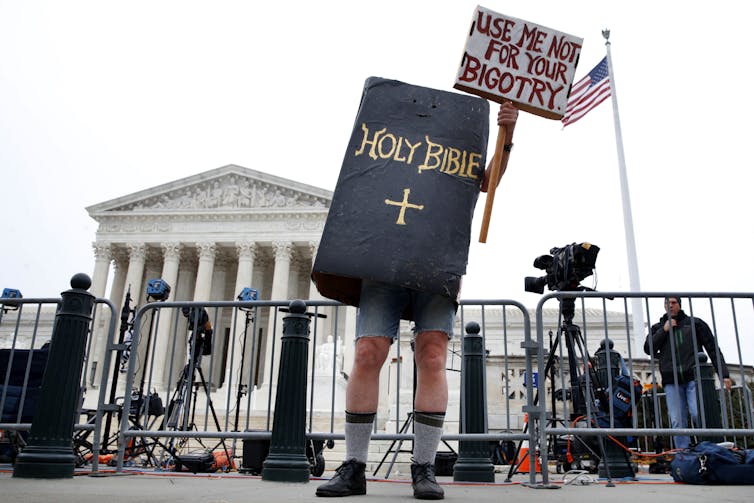
By Pauline Jones and Andrew Murphy
When the Supreme Court ruled in 303 Creative v. Elenis in 2023 that a businessperson could not be compelled to create art that violates their religious beliefs – specifically, a wedding website for a same-sex ceremony – supporters of the decision celebrated it as a victory for freedom of religion and expression.
On the day the ruling was issued, the conservative Family Research Council called it “the latest in a trend of victories for free speech and religious liberty,” while the Foundation for Individual Rights and Expression hailed “a resounding victory for freedom of expression and freedom of conscience.”
But contrary to these claims, the Supreme Court’s decision does not protect the freedoms of all Americans. Rather, it represents the culmination of a decadelong strategy by conservative Christians – known sometimes as the Christian right – to use the courts to limit the freedoms of groups of Americans of whom they disapprove. On issues where the Christian right’s First Amendment claims directly threaten the equal citizenship of sexual minorities, for example, the court left no question about which side it was on.
As experts on religion and politics globally and in the United States, we think the effectiveness of this strategy has the potential to degrade both the quality of American democracy and freedoms of religion and expression.
The First Amendment protects a cluster of core rights and freedoms: religion, speech, press, peaceful assembly and petitioning the government.
The 303 Creative decision threatens to undermine this crucial set of rights by privileging a particular group’s version of what it means to exercise speech and religion. We believe that will have harmful consequences for sexual minorities’ pursuit of inclusion and full citizenship across a range of domains, from intimate behavior and expression to inclusion in the commercial and economic realms.
Lower courts that ruled against 303 Creative argued that the state has a compelling interest to protect the “dignity” of members of marginalized groups that has been a cornerstone of previous Supreme Court decisions securing gay rights.
By overturning these lower court decisions, the Supreme Court’s ruling upends this standard of human dignity as central to liberty. It may also encourage other groups to seek exemptions from anti-discrimination laws, thus depriving the government of a crucial tool to protect those who face intolerance.

AP Photo/Ira Schwarz
‘Moral majority’ builds a movement
The Christian right emerged during the 1970s in response to a range of cultural and political upheavals in American society, including the civil rights movement, the sexual revolution and Supreme Court rulings that struck down public school prayer and guaranteed rights to contraception and, later, abortion.
Some scholars have argued that the Christian right’s growth benefited American democracy by mobilizing millions of Americans who had previously felt alienated from the political system, incorporating them into the democratic process.
The movement’s claim to represent a “moral majority” animated its efforts, both legislative and in the courts, to seek political change consistent with its religious convictions on issues like abortion, public school prayer and homosexuality.
Its embrace of traditionalist conservatism – support for school prayer, outlawing abortion, opposition to gay rights – did not always yield concrete successes, but the movement played an important role in the political process and grew influential within the Republican Party from the 1980s into the 21st century.
By the early 2000s, the Christian right focused its efforts on countering the growing public support for same-sex marriage on both the federal and state levels.
Strategy shifts
By the mid-2000s, the limitations of this strategy were becoming apparent, including a stark rise in support for same-sex marriage and an equally stark decline in religiosity among Americans.
These changes were reflected in Supreme Court decisions like United States v Windsor in 2013, which struck down the Defense of Marriage Act, which had banned federal recognition of same-sex marriage, and Obergefell v Hodges in 2015, which guaranteed same-sex couples the right to marry.
So the leaders of the Christian right decided on a different strategy. Rather than seeking to change laws or policies that conflicted with their religious views, conservative Christians sought to be exempted from following them.
While the movement’s leaders had earlier attempted to secure legislation or court rulings consistent with their moral positions, it now sought exemptions to anti-discrimination law based on their religious opposition to the groups being protected.
Substantively, they moved away from solely invoking their rights to free exercise of religion under the First Amendment. They began, instead, emphasizing their right to creative expression and free speech, also protected by the First Amendment, as the foundation of their claims to exemptions.
This shift can be seen most starkly when 303 Creative is viewed in light of two other recent cases – the Hobby Lobby case in 2014 and the Masterpiece Cakeshop case in 2018. All three cases present legal arguments based on religious grounds, but they present them in different ways.
In Hobby Lobby, the plaintiff claimed that providing employees with insurance that included access to contraception violated the corporation’s right to religious exercise. In Masterpiece Cakeshop, the defendant instead grounded his refusal to bake a cake for a same-sex couple’s wedding on his right to free speech and creative expression. As in 303 Creative, the argument relied on the “compelled speech doctrine,” which prohibits the government from forcing individuals to express ideas with which they disagree.
In ruling for Hobby Lobby, Masterpiece Cakeshop and 303 Creative, the Court endorsed the exemption-based strategy and the transition from religion to speech as justification for those exemptions.

AP Photo/Jacquelyn Martin
Snowballing threats
The success of this strategic shift, from seeking to overturn objectionable policies to seeking exemptions from them, threatens to upset the delicate balance among the cluster of core-related rights and freedoms – religion, speech, press and assembly –protected by the First Amendment.
These core rights and freedoms are placed at risk when anyone is exempted from the constitutional requirement to treat their fellow Americans as equal citizens under the law.
The emphasis on free speech in these Supreme Court decisions, moreover, has obscured the crucial role played by religion as the basis for objecting to anti-discrimination laws. The objection to compelled speech in 303 Creative is about religious convictions – evident in the plaintiff’s complaint that “the state of Colorado told me that I couldn’t speak consistent with my beliefs .”
The Supreme Court’s decision in 303 Creative has another potentially serious consequence for American democracy: It undermines the force of anti-discrimination law, depriving the government of a crucial lever for protecting those who face religiously based hostility while disregarding the burdens that such exemptions place on others.
As Justice Sonia Sotomayor’s dissent in the 303 Creative case makes clear, these burdens include one group of Americans being denied access to goods and services that are otherwise publicly available, and consequently, a loss of dignity for that group.
Sotomayor provides several concrete examples, including one about a gay man going to a funeral home and not being able to bury his husband. Thus his grief is compounded by humiliation based on his sexual orientation.
We are, of course, not the first to point out the tensions between religious freedom and democracy in American history. Anti-discrimination laws are one way to address these tensions because they can level the playing field among citizens of different faiths and between those with and without faith. Liberty pertains to both freedom of and freedom from religion.
But it is increasingly clear from the nation’s highest court that religious objections can invalidate these protections and provide popular intolerance with an end run around the law. Writing before the 303 Creative decision, one observer predicted a Pandora’s box of religious exemptions. That box now seems to be wide open.
![]()
Pauline Jones is Professor of Political Science at the University of Michigan. Andrew Murphy is Professor of Political Science at the University of Michigan.





























Pogo says
@FWIW
Right under your nose
https://www.google.com/search?q=dominionism+christian+fascism
Deborah Coffey says
Absolutely correct. And, that’s why we now despise the Supreme Court of the United States. I’ve personally lost all respect.
Laurel says
This is exactly why we should not allow one political side have dominance in the Supreme Court. It is Mitch McConnell’s life mission to stuff the courts with Republicans. This is also exactly why Trump wanted to stuff the courts with Republicans so he would have prejudice in his favor.
If a Supreme Court member has specific religious beliefs, that Justice should recuse him/herself from any religious questions before the court. Same with political views. Justice is supposed to be blind to prejudice. The Justices should also not be able to monitor their behaviors themselves. They should follow a set of rules set by the people.
The U.S. has a very large Jewish population, yet I haven’t heard any opinions from their organizations. I am surprised. I would like to know what they think of this. Not being a person who follows organized religion, I very much dislike the far right Christians trying to run our lives. They should mind their own business.
Not everything falls under freedom of speech. I believe in freedom of religion, and freedom from religion. Anything else is not freedom.
endless dark money says
its a stolen corrupt clown court and should be revised. all cases since it was stolen need to be re reviewed after of course the sex offenders and bribed officials are removed. gop have been sucessful in dismantling your rights , they should follow their orange jesus to federal prision.